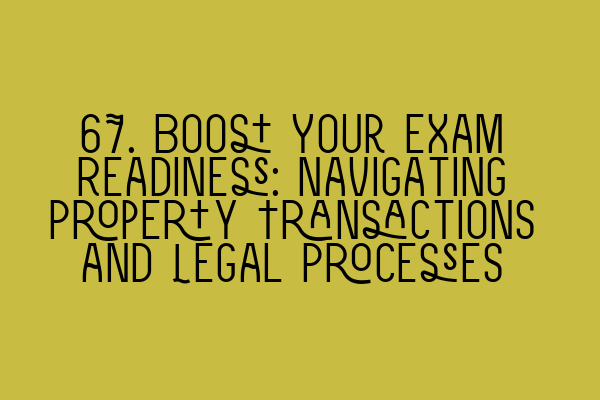**67. Boost Your Exam Readiness: Navigating Property Transactions and Legal Processes**
As a prospective solicitor, understanding property law and land law is crucial to your success in the field. The SQE exams assess your knowledge and competence in various legal areas, including property transactions and legal processes. In this blog post, we will delve into key topics and provide you with essential information to boost your exam readiness.
**Property Transactions: An Overview**
Property transactions involve the buying, selling, and transferring of property rights. These transactions can be complex and require careful consideration of legal processes and documentation. As a property law solicitor, you’ll encounter a wide range of cases, from residential property purchases to commercial lease agreements.
To excel in property transactions, it is important to have a solid understanding of key concepts such as title deeds, contracts, leases, and mortgages. Let’s take a closer look at each of these areas:
**1. Title Deeds**
Title deeds provide proof of ownership for a property. These documents include information about the property’s boundaries, rights, restrictions, and any encumbrances. It is crucial for solicitors to examine title deeds thoroughly to ensure there are no legal issues that may affect the transaction. Additionally, understanding the concepts of freehold and leasehold is essential in property law.
**2. Contracts**
Contracts form the basis of property transactions. They outline the terms and conditions agreed upon by the parties involved. Solicitors play a crucial role in drafting and reviewing contracts to ensure they accurately reflect the intentions of the parties and comply with legal requirements. Understanding the essential elements of a contract, such as offer, acceptance, consideration, and intention to create legal relations, will be key in navigating property transactions.
**3. Leases**
Leases are legal agreements that grant a party the right to occupy a property for a specified period of time. Residential leases and commercial leases have their own unique considerations and legal requirements. Solicitors must understand the intricacies of lease agreements, such as rent, repairs, and termination clauses, in order to effectively advise clients and negotiate on their behalf.
**4. Mortgages**
Mortgages are financial agreements that allow individuals to borrow money to purchase property. Solicitors must have a good understanding of mortgage law to guide clients through the process and ensure that all legal requirements are met. Topics such as loan-to-value ratios, interest rates, and repayment terms are crucial considerations in property transactions.
**Legal Processes and Procedures**
In addition to understanding the key concepts involved in property transactions, solicitors must also be familiar with various legal processes and procedures. Below are some important areas to focus on:
**1. Land Registry**
The Land Registry is a government department responsible for maintaining a register of land and property ownership in England and Wales. Solicitors must understand the land registration process and be able to conduct effective searches to uncover any legal issues or encumbrances affecting the property.
**2. Searches**
Searches play a vital role in property transactions. These include Local Authority searches, Environmental searches, and Water and Drainage searches, among others. Solicitors must know which searches to conduct and how to interpret the results in order to advise clients properly.
**3. Stamp Duty Land Tax**
Stamp Duty Land Tax (SDLT) is a tax paid on property transactions. Solicitors must be familiar with SDLT rates, exemptions, and how to accurately calculate and report the tax to the relevant authorities.
**4. Completion Process**
The completion process involves the final steps of a property transaction, including the exchange of funds and transfer of legal ownership. Solicitors must understand the legal formalities and timelines involved to ensure a smooth and legally compliant completion.
**Boosting Your Exam Readiness**
Preparing for the SQE exams can be challenging, but with the right approach, you can enhance your chances of success. Here are some tips to help you boost your exam readiness:
1. **Take Practice Exams**: Practice makes perfect, and taking practice exams is an excellent way to assess your knowledge and identify areas for improvement. Check out SQE 1 Practice Exam Questions to test your understanding.
2. **Mock Exams**: Simulating the exam environment through mock exams can help you build confidence and improve your time management skills. SQE 1 Practice Mocks FLK1 FLK2 provides valuable mock exam resources to help you prepare effectively.
3. **Preparation Courses**: Enrolling in SQE preparation courses can provide you with structured learning materials, guidance from experienced tutors, and additional resources to enhance your understanding. Consider exploring SQE 1 Preparation Courses and SQE 2 Preparation Courses to boost your exam readiness.
4. **Stay Updated**: Stay up to date with the latest developments in property law and land law to ensure your knowledge is current. The SRA SQE Exam Dates article provides important information about upcoming exam dates and registration deadlines.
5. **Seek Guidance**: Don’t hesitate to seek guidance from qualified professionals and experienced solicitors. They can provide valuable insights, answer your queries, and help clarify any areas of confusion.
Navigating property transactions and legal processes requires a comprehensive understanding of the law and attention to detail. By immersing yourself in the key concepts, familiarizing yourself with legal procedures, and adopting effective study strategies, you can boost your exam readiness and set yourself up for success in property law and land law.
Remember, preparation is key, and with the right approach, you can confidently tackle the SQE exams and embark on a successful career as a property law solicitor.
